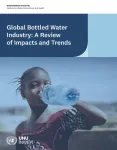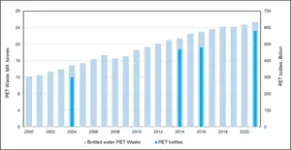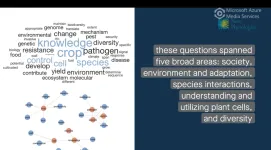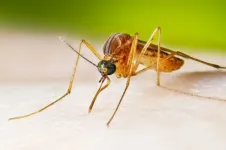(Press-News.org) The rapidly-growing bottled water industry can undermine progress towards a key sustainable development goal: safe water for all, says a new United Nations report.
Based on an analysis of literature and data from 109 countries, the report says that in just five decades bottled water has developed into “a major and essentially standalone economic sector,” experiencing 73% growth from 2010 to 2020. And sales are expected to almost double by 2030, from US$ 270 billion to $500 billion.
Released a few days prior to World Water Day (March 22), the report by UN University’s Canadian-based Institute for Water, Environment and Health concludes that the unrestricted expansion of the bottled water industry “is not aligned strategically with the goal of providing universal access to drinking water or at least slows global progress in this regard, distracting development efforts and redirecting attention to a less reliable and less affordable option for many, while remaining highly profitable for producers.”
Says Kaveh Madani, UNU-INWEH’s new Director: “The rise in bottled water consumption reflects decades of limited progress in and many failures of public water supply systems.”
When the Sustainable Development Goals were agreed in 2015, he notes, experts elsewhere estimated an annual investment of US$ 114 billion was needed from 2015 to 2030 to achieve a key target: universal safe drinking water.
The report says providing safe water to the roughly 2 billion people without it woulds require an annual investment of less than half the US$ 270 billion now spent every year on bottled water.
“This points to a global case of extreme social injustice, whereby billions of people worldwide do not have access to reliable water services while others enjoy water luxury.”
Tap water perceptions
The study quotes surveys showing bottled water is often perceived in the Global North as a healthier and tastier product than tap water – more a luxury good than a necessity. In the Global South, sales are driven by the lack or absence of reliable public water supplies and water delivery infrastructure limitations due to rapid urbanization.
In mid- and low-income countries, bottled water consumption is linked to poor tap water quality and often unreliable public water supply systems – problems often caused by corruption and chronic underinvestment in piped water infrastructure.
Beverage corporations are adept at marketing bottled water as a safe alternative to tap water by drawing attention to isolated public water system failures, says UNU-INWEH researcher and lead author Zeineb Bouhlel, adding that “even if in certain countries piped water is or can be of good quality, restoring public trust in tap water is likely to require substantial marketing and advocacy efforts.”
Not necessarily safe
Dr. Bouhlel notes that the source of bottled water (municipal system, surface, etc.) the treatment processes used (e.g. chlorination, ultraviolet disinfection, ozonation, reverse osmosis), the storage conditions (duration, light exposure, temperature), and packaging (plastic, glass), can all potentially alter water quality. This may be inorganic (e.g. heavy metals, pH, turbidity etc.), organic (benzene, pesticides, microplastics, etc.) and microbiological (pathogenic bacteria, viruses, fungus and parasitic protozoa).
According to the report, “the mineral composition of bottled water can vary significantly between different brands, within the same brand in different countries, and even between different bottles of the same batch.”
The report lists examples from over 40 countries in every world region of contamination of hundreds of bottled water brands and all bottled water types.
“This review constitutes strong evidence against the misleading perception that bottled water is an unquestionably safe drinking water source,” says Dr. Bouhlel.
Water bottlers generally face less scrutiny than public water utilities
Co-author Vladimir Smakhtin, past Director of UNU-INWEH, underscores the report’s finding that “bottled water is generally not nearly as well-regulated and is tested less frequently and for fewer parameters. Strict water quality standards for tap water are rarely applied to bottled water, and even if such analyses are carried out, the results seldom make it to the public domain.”
Bottled water producers, he says, have largely avoided the scrutiny governments impose on public water utilities, and amid the market’s rapid growth, it is “probably more important than ever to strengthen legislation that regulates the industry overall, and its water quality standards in particular.”
With respect to the industry’s environmental impacts, the report says there is “little data available on water volumes extracted,” largely due to the lack of transparency and legal foundation that would have forced bottling companies to disclose that information publicly and assess the environmental consequences.”
“Local impacts on water resources may be significant,” the report says.
In the USA, for example, Nestlé Waters extracts 3 million litres a day from Florida Springs; in France, Danone extracts up to 10 million litres a day from Evian-les-Bains in the French Alps; and in China, the Hangzhou Wahaha Group extracts up to 12 million litres daily from Changbai Mountains springs.
Regarding plastic pollution, the researchers cite estimates that the industry produced around 600 billion plastic bottles and containers in 2021, which converts to some 25 million tonnes of PET waste – most of it not recycled and destined for landfills – a mass of plastic equal to the weight of 625,000 40-ton trucks, enough to form a bumper-to-bumper line from New York to Bangkok.
According to the report, the bottled water sector used 35% of the PET bottles produced globally in 2019; 85% wind up in landfills or unregulated waste.
By the numbers
Among the report’s many insights, derived from data analysis and other information assembled from global studies and literature:
Over 1 million bottles of water are sold worldwide every minute
Annual spending per capita worldwide is US$ 34
Worldwide annual consumption of the three main bottled water types – treated, mineral, and natural – is estimated at 350 billion litres
The estimated US $1.225 trillion in bottled water revenues represent 17 to 24% of the global market for non-alcoholic packaged beverages
The biggest market segment (with 47% of global sales) is treated bottled water, which could originate from public water systems or surface water, and that undergoes a disinfection treatment such as chlorination
Citizens of Asia-Pacific are the biggest bottled water consumers, followed by North Americans and Europeans
60% of global sales are in the “Global South” (Asia-Pacific, Africa, Latin America and the Caribbean)
By country, the USA is the largest market, with around US$ 64 billion in sales, followed by China (almost US$ 45 billion) and Indonesia (US$ 22 billion). Together, these three countries constitute almost half of the world market. Other top countries by sales: Canada, Australia, Singapore, Germany, Thailand, Mexico, Thailand, Italy, Japan
The average cost of a bottle of water in North America and Europe is around US$ 2.50, more than double the price in Asia, Africa and LAC ($0.80, $0.90 and $1, respectively). Australia, the fifth largest market, has the highest average price: $3.57 per unit.
Bottled water per litre can cost 150 to 1,000 times more than the price a municipality charges for tap water.
Biggest per capita consumers: Singapore and Australia. Citizens of Singapore spent $1,348 per capita on bottled water in 2021, Australians $386
According to previous studies, about 31% of Canadians, 38% of Americans, and 60% of Italians use bottled water as their primary drinking source. In the Dominican Republic, 60% of households use bottled water as their primary water source, with a strong correlation between income and bottled water consumption. About 80% of Mexicans use bottled water, and 10% use home-purified water as their primary drinking water source; roughly 90% cite health concerns for doing so
Egypt is the fastest-growing market for treated bottled water (40% per year). Seven other countries from the Global South are among the top 10 fastest-growing markets: Algeria, Brazil, Indonesia, United Arab Emirates, India, Morocco, and Saudi Arabia.
In Europe, Germany is the biggest bottled water market; in Latin America and the Caribbean, Mexico is the biggest market; in Africa, it’s South Africa.
Treated water appears to be the market’s largest component by volume, while natural waters appear to generate the most profit.
Five companies – PepsiCo, Coca-Cola, Nestlé S.A., Danone S.A, and Primo Corporation have combined sales of $65 billion, over 25% of the global total
Earlier studies of water withdrawals declared in India, Pakistan, Mexico and Nepal showed total estimated withdrawals by Coca-Cola and Nestlé in 2021 at 300 and 100 billion litres, respectively
* * * * *
UNU-INWEH
http://bit.ly/1vjfKAS
The UNU Institute for Water, Environment and Health is a member of the United Nations University family of organizations. It is the UN Think Tank on Water created by the UNU Governing Council in 1996. Its mission is to help resolve pressing water challenges of concern to the UN, its Member States and their people, through knowledge- based synthesis of existing bodies of scientific discovery; cutting edge targeted research that identifies emerging policy issues; application of on-the-ground scalable solutions based on credible research; and relevant and targeted public outreach. UNU-INWEH is hosted by the Government of Canada and McMaster University.
END
Bottled water masks world’s failure to supply safe water for all, can slow sustainable development: UN
Needed to provide safe water to roughly 2 billion people without it: an annual investment less than half the US$ 270 billion now spent each year on bottled water
2023-03-16
ELSE PRESS RELEASES FROM THIS DATE:
Quantifying the life expectancy gap for people living with sickle cell disease
2023-03-16
(WASHINGTON, March 16, 2023) – While research has long established disparities in health outcomes among individuals living with sickle cell disease (SCD), few studies have quantified these gaps. A new study published in Blood Advances finds that the average life expectancy of publicly insured patients living with SCD is roughly 52.6 years. In contrast, the CDC reports that the average life expectancy in the United States is 73.5 years for men and 79.3 years for women, demonstrating the considerable ...
Genetics as conservation tool for endangered chimpanzees
2023-03-16
The western chimpanzees of Guinea are threatened by mining activities. Using a novel genetic approach, UZH researchers and an international team have collected information on population size and community structure of the endangered species. These data provide an important baseline to assess the impact of mining.
The western chimpanzee is listed as “Critically Endangered” on the Red List of the International Union for the Conservation of Nature. The Mount Nimba Strict Nature Reserve, a UNESCO World Heritage site, located on the borders of Guinea, Liberia and Côte ...
CityU scientists develop energy-saving, tunable meta-devices for high-precision, secure 6G communications
2023-03-16
The future of wireless communications is set to take a giant leap with the advent of sixth-generation (6G) wireless technology. A research team at City University of Hong Kong (CityU) invented a groundbreaking tunable terahertz (THz) meta-device that can control the radiation direction and coverage area of THz beams. By rotating its metasurface, the device can promptly direct the 6G signal only to a designated recipient, minimizing power leakage and enhancing privacy. It is expected to provide a highly adjustable, directional and secure means for future 6G communications systems.
The potential of THz band technology ...
Ochsner Health advances precision medicine, becomes national leader in universal genomic testing for chemotherapy
2023-03-16
New Orleans, Louisiana – Ochsner Health is leading the way for precision medicine nationwide by becoming one of the first hospital systems to standardize genomic testing, significantly advancing ways in which care teams can treat cancer patients. This change helps providers determine individualized treatment by understanding how patients will react to certain drugs, thereby lowering risk of adverse side effects, improving patient experience, and bettering patient outcomes.
Pharmacogenomics, or PGx, testing guides physicians how patients metabolize certain drugs and warns of possible side effects so they may ...
Bigger flowers, greater rewards: Plants adapt to climate disruptions to lure pollinators
2023-03-16
Photos
There's been a well-documented shift toward earlier springtime flowering in many plants as the world warms. The trend alarms biologists because it has the potential to disrupt carefully choreographed interactions between plants and the creatures—butterflies, bees, birds, bats and others—that pollinate them.
But much less attention has been paid to changes in other floral traits, such as flower size, that can also affect plant-pollinator interactions, at a time when many insect pollinators are in global decline.
In ...
Novel disease models for multiple myeloma
2023-03-16
B lymphocytes – also known simply as B cells – play a central role in the immune system. If pathogens enter the body, B cells are activated and develop into plasma cells, which then release antibodies. One important step in this process is the germinal center reaction. If the B cells’ maturation into plasma cells is disrupted, multiple myeloma can develop – one of the most common blood cancers. This disease has a variety of subtypes and is not yet curable.
Multiple myelomas develop very slowly and in several stages. The process is initiated by spontaneous genetic aberrations that occur ...
Scientists identify 100 important questions facing plant science
2023-03-16
What are the key research priorities that will help tackle the global challenges of climate change, the biodiversity crises and feed a growing population in a sustainable way? Ten years after these priorities were first debated and summarised by a panel of scientists and published in New Phytologist, the panel reflects on the changes to plant science and the progress made to address these research areas, published on 16 March in a Letter in New Phytologist.
To re-evaluate research priorities, a new panel was formed in 2022 to provide an international perspective on the important areas for plant science research. This project, ...
Clinical trial investigating innovative way to control Type 2 diabetes
2023-03-16
LOS ANGELES — More than 37 million Americans have diabetes, and approximately 90-95% have Type 2 diabetes.
Diabetes is a chronic condition where the body does not produce or effectively use insulin. A lack of insulin leads to raised blood glucose (sugar) levels, which can cause heart disease and stroke, kidney disease, nerve damage and other severe complications.
Keck Medicine of USC has launched a Phase 2 clinical trial investigating the effectiveness of a new outpatient, nonsurgical endoscopic procedure in stabilizing blood glucose levels for patients.
“Currently, the only treatment for diabetes ...
Humans bite back by deactivating mosquito sperm
2023-03-16
New UC Riverside research makes it likely that proteins responsible for activating mosquito sperm can be shut down, preventing them from swimming to or fertilizing eggs.
The study could help control populations of Culex, the common house mosquito that transmits brain-swelling encephalitis and West Nile Virus.
“During mating, mosquitoes couple tail to tail, and the males transfer sperm into the female reproductive tract. It can be stored there awhile, but it still has to get from point A to point B to complete fertilization,” said Cathy Thaler, UCR cell biologist and the study’s first author.
Key to completing that journey are the specialized proteins secreted ...
New findings published in AJIC highlight clinician perspectives on barriers to reliable hand hygiene
2023-03-16
Arlington, Va., March 16, 2023 – Findings from a new study published in the American Journal of Infection Control (AJIC), highlight perceptions of and barriers to reliable hand hygiene among specific clinician subgroups. The results, from the first study of its kind, provide insights that can be used to design and implement future, targeted interventions to optimize hand hygiene reliability among medical professionals.
“While prior studies focused on challenges to hand hygiene reliability by healthcare role, we believe our study is the first to highlight key differences in perceived barriers ...
LAST 30 PRESS RELEASES:
Scientists show how to predict world’s deadly scorpion hotspots
ASU researchers to lead AAAS panel on water insecurity in the United States
ASU professor Anne Stone to present at AAAS Conference in Phoenix on ancient origins of modern disease
Proposals for exploring viruses and skin as the next experimental quantum frontiers share US$30,000 science award
ASU researchers showcase scalable tech solutions for older adults living alone with cognitive decline at AAAS 2026
Scientists identify smooth regional trends in fruit fly survival strategies
Antipathy toward snakes? Your parents likely talked you into that at an early age
Sylvester Cancer Tip Sheet for Feb. 2026
Online exposure to medical misinformation concentrated among older adults
Telehealth improves access to genetic services for adult survivors of childhood cancers
Outdated mortality benchmarks risk missing early signs of famine and delay recognizing mass starvation
Newly discovered bacterium converts carbon dioxide into chemicals using electricity
Flipping and reversing mini-proteins could improve disease treatment
Scientists reveal major hidden source of atmospheric nitrogen pollution in fragile lake basin
Biochar emerges as a powerful tool for soil carbon neutrality and climate mitigation
Tiny cell messengers show big promise for safer protein and gene delivery
AMS releases statement regarding the decision to rescind EPA’s 2009 Endangerment Finding
Parents’ alcohol and drug use influences their children’s consumption, research shows
Modular assembly of chiral nitrogen-bridged rings achieved by palladium-catalyzed diastereoselective and enantioselective cascade cyclization reactions
Promoting civic engagement
AMS Science Preview: Hurricane slowdown, school snow days
Deforestation in the Amazon raises the surface temperature by 3 °C during the dry season
Model more accurately maps the impact of frost on corn crops
How did humans develop sharp vision? Lab-grown retinas show likely answer
Sour grapes? Taste, experience of sour foods depends on individual consumer
At AAAS, professor Krystal Tsosie argues the future of science must be Indigenous-led
From the lab to the living room: Decoding Parkinson’s patients movements in the real world
Research advances in porous materials, as highlighted in the 2025 Nobel Prize in Chemistry
Sally C. Morton, executive vice president of ASU Knowledge Enterprise, presents a bold and practical framework for moving research from discovery to real-world impact
Biochemical parameters in patients with diabetic nephropathy versus individuals with diabetes alone, non-diabetic nephropathy, and healthy controls
[Press-News.org] Bottled water masks world’s failure to supply safe water for all, can slow sustainable development: UNNeeded to provide safe water to roughly 2 billion people without it: an annual investment less than half the US$ 270 billion now spent each year on bottled water








